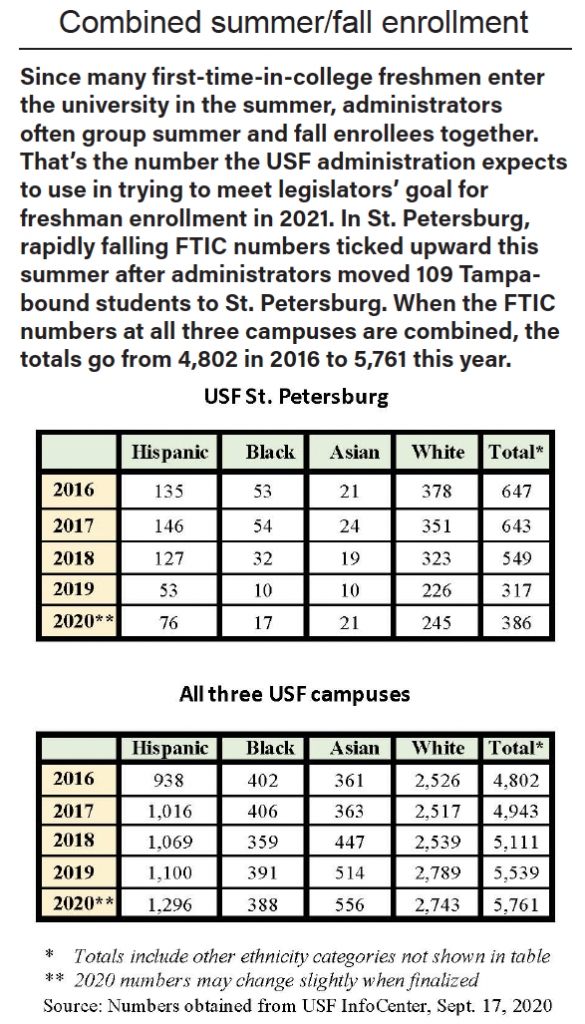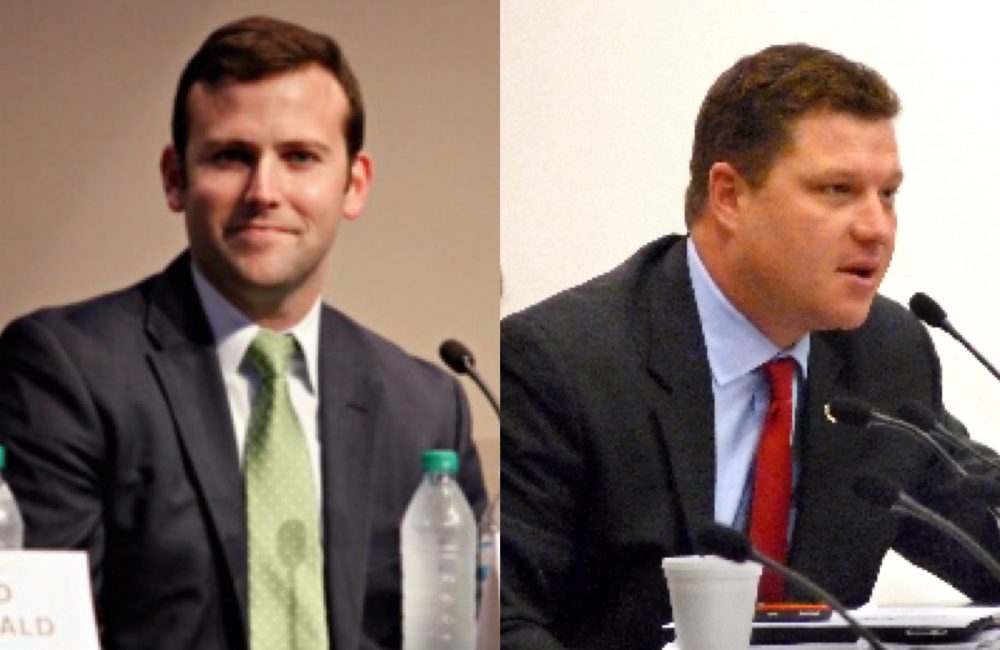State Rep. Chris Sprowls, R-Palm Harbor (left) and Sen. Jeff Brandes, R-St. Petersburg, want to see far more freshmen in 2021.
Courtesy of Grace Cunningham and Wikimedia Commons
By Nancy McCann
Two powerful legislators who led the move to strip USF St. Petersburg of its independence in 2018 are now trying to boost its badly sagging enrollment.
Rep. Chris Sprowls, R-Palm Harbor, and Jeff Brandes, R-St. Petersburg, announced Oct. 8 that the USF administration and trustees are committed “to growing enrollment …with a strong goal of 650 students for next year’s class.”
The announcement, which came on Twitter, thanks Board of Trustees Chair Jordan Zimmerman and President Steve Currall for “their dedication to this shared objective.”
But the brief announcement does not explain how the lawmakers expect USF to achieve that ambitious goal. It also does not address the campus’ dismal diversity numbers for incoming freshmen.
USF spokesperson Adam Freeman said “it’s our understanding” that the legislators’ enrollment target refers to the number of first-time-in-college freshmen who will enroll in the summer and fall of 2021.
Since 2016 the number of summer and fall FTIC students has plummeted from 647 to 386 this year – a number that administrators boosted this summer by moving 109 Tampa-bound students to St. Petersburg (see chart below).

Meanwhile, the number of Hispanic students for summer and fall has tumbled from 135 to 76 and the number of black students from 53 to 17. This fall only one black freshman enrolled in St. Petersburg.
Asked what steps the university will take to meet the enrollment goal, Freeman said in an email to The Crow’s Nest, “The actions are being refined and will be discussed at the upcoming meeting of the USF St. Petersburg Campus (Advisory) Board.”
The board, seven Pinellas County residents who help oversee the campus, will meet at 9 a.m. Oct. 22 in the USC ballroom. Its chair, banker Stephanie Goforth, is also vice chair of the Board of Trustees.
The tweet from Sprowls and Brandes comes amid a growing chorus of criticism from Pinellas County community leaders who are denouncing both legislators and USF administrators for the way consolidation is unfolding.
One of the loudest critics is St. Petersburg Mayor Rick Kriseman, who told The Crow’s Nest this month that consolidation developments are “exactly what we feared would happen” when – without warning or much deliberation – the Legislature abruptly ended USF St. Petersburg’s independence and ordered the university’s three campuses to seek a single accreditation.
In a sternly worded letter to Brandes on Oct. 9, Kriseman called on legislators “to either hold the Board of Trustees accountable or file legislation unwinding the consolidation.” (Read the full letter below)
Meanwhile, Ed Montanari, the chair of the St. Petersburg City Council, told The Crow’s Nest that he will not “sit idly by” and “let USF St. Petersburg just kind of wither away and die on the vine.”
Pinellas County Commissioner Ken Welch told the newspaper that he has shared his concerns over the campus’ troubling diversity numbers with Sprowls.
And Chris Steinocher, the president and CEO of the St. Petersburg Area Chamber of Commerce, said he knew from the start “that this (consolidation) was going to go wrong.”
They’re listening
Sprowls, who is the incoming speaker of the Florida House, and Brandes seem to be listening.
Sprowls has not responded to several interview requests from The Crow’s Nest in recent weeks, but Brandes has criticized USF leaders for violating both the letter and spirit of laws designed to protect the two smaller campuses.
Brandes also served notice that the Legislature is poised to amend the law again and take action on the trustees, the 13-member board that governs USF.
“I think there need to be some trustees replaced – period,” he said last week.
Legislators expect the trustees and administration to “change the trajectory” of consolidation and have “a new plan in place” by January, two months before the legislative session begins on March 2, Brandes said.
Since the consolidation of USF was mandated in March 2018, its trustees and Tampa-based administrators have made clear that their top priority is retaining USF’s newly won status as one of the state’s three preeminent research universities.
They also are seeking to become a member of the Association of American Universities (AAU). There are now 65 members, which are described as the country’s top “distinguished research universities.”
They have been so seemingly unenthusiastic about the two smaller campuses that legislators wrote some protections into the statutes.
After seeking recommendations from a consolidation task force about “maintaining the unique identity of each campus,” the Legislature specified that the two campuses would keep their names – USF St. Petersburg and USF Sarasota-Manatee.
In a major change, the Legislature also stipulated that they would be full branch campuses as defined by the regional accrediting agency, with their own budgetary and hiring authority.
But twice – in September 2019 and again in January 2020 – President Currall released proposed organization plans that would have undercut the authority of the regional chancellors in St. Petersburg and Sarasota-Manatee.
And twice he was forced to walk them back.
In recent months, the administration has resumed chipping away at St. Petersburg.
Key personnel who reported to Regional Chancellor Martin Tadlock now directly report to Tampa. There has been talk of merging the separate budgets of the three campuses – which are required by law – into one. And the campus was informed Aug. 31 that its name is now “USF St. Petersburg campus” – with a lowercase “c.”
Pushing back
Although these developments have gone largely unreported in the Tampa Bay Times, reports in The Crow’s Nest have caught the attention of legislators and Pinellas leaders. And they are pushing back.
Commissioner Welch is one of 20 Pinellas elected officials who signed a letter in 2018 outlining consolidation concerns and emphasizing that USF St.Petersburg should remain attainable to the “diverse array” of students in Pinellas County.
Welch said last week he has come to accept that accessibility for local high school students has been impeded and “changed forever” by consolidation – inevitable because this was “built in with the new standards for admission.”
“It played out, as many of us were concerned, with an impact on the broader community but especially on minority communities,” Welch said. He said he spoke with Sprowls about this, especially The Crow’s Nest report that there is only one new black freshman this fall.
“What I’m looking for is that Speaker Sprowls and Sen. (Darryl) Rouson and others who spoke to this … hold USF Tampa accountable and make sure that the things they promised are happening (at USF St. Petersburg) in terms of local input, local budget and employment oversight,” he said.
Now, Welch said, he “really looks at St. Pete College” for the community’s access to a four-year college.
Welch said he agrees with Brandes that the makeup of the USF Board of Trustees needs to be examined to improve the representation from St. Petersburg and Pinellas County.
Steinocher said that the chamber he leads was also concerned about consolidation from the start.
He said he questioned whether the state of Florida can afford to have three preeminent research universities. For what he called “the march toward AAU” membership, it’s difficult for states to have the resources for just “one of those,” he said.
Instead, he said, the chamber had urged legislators and university leaders to focus on areas where USF St. Petersburg had been “rocking and rolling” under its own accreditation.
“We wanted universities that were nimble enough to teach those folks that we wanted to employ here in our communities right now,” he said. “We didn’t want to have black brain drain; we didn’t want to have brain drain in general from our community.
“We’ve completely failed ourselves, especially with freshmen of color. How much are you asking students to achieve now to come to USF St. Pete?”
Steinocher said the chamber “really took its lumps” on consolidation when – early in the planning stage – the legislative delegation and university administration told the chamber to “stand down” and trust them.
“We did not feel like it was a fair conversation,” Steinocher said.
Steinocher appears to have been on target two years ago when he questioned the bigger picture of preeminence status, the achievement by the Tampa campus in 2018 that Sprowls called the primary reason to consolidate the three campuses.
Although prior years’ preeminence funding recurs in the annual budgets of the state’s three preeminent universities, the Legislature has awarded no new preeminence funding in the past two years.
‘My hope is now waning’
This is the letter that St. Petersburg Mayor Rick Kriseman sent to Sen. Jeff Brandes, R-St. Petersburg, on Oct. 9:
Dear Senator Brandes,
I hope you and your family are well and healthy.
I am writing to express my disappointment in the manner that consolidation is occurring within the University of South Florida. Given that it was you, according to a Tampa Bay Times article dated February 2, 2018, who brought the idea of consolidation to former USF President Judy Genshaft, I am contacting you as the creator of the concept, in the hopes that you can correct what so many of us feared would occur.
Based on a recent Crow’s Nest story, I am encouraged that you appear to share my concerns about the way this is unfolding and the potential violation of the law you shepherded.
Of the utmost importance to me is the future of USF St. Petersburg, which by law, is required to be called USF St. Petersburg and not the ‘St. Petersburg Campus’ (as it currently appears on their website).
Additionally, USFSP should have its own budget, and Regional Chancellor Martin Tadlock should have the autonomy and the critical staff who report directly to him to lead our city’s university into the future. I know you agree.
For as long as I can remember, USF St. Petersburg has thrived in spite of the leadership and decisions made in Tampa. While consolidation was unwelcome and presented new challenges, I was hopeful that USFSP would continue to thrive so long as the letter of the new law was followed. My hope is now waning.
I strongly encourage you and your colleagues in the Florida Legislature to either hold the USF Board of Trustees accountable or file legislation unwinding the consolidation. Finally, future actions should unfold deliberately and transparently. Anything less is a disservice to our community and region.
Thank you in advance for your leadership and please let me know if I can be of assistance.
Sincerely,
Rick Kriseman
Mayor
City of St. Petersburg



